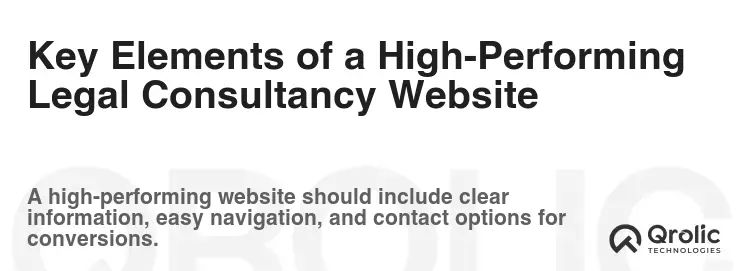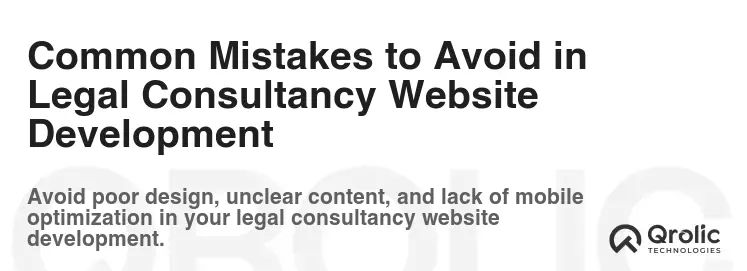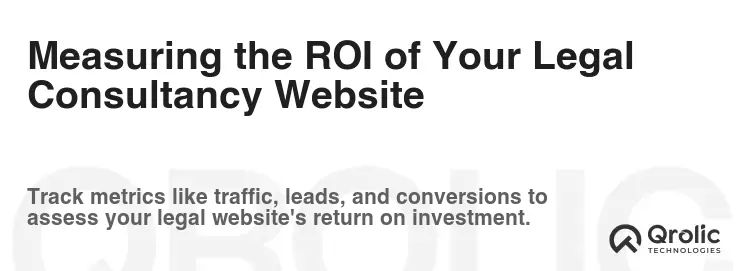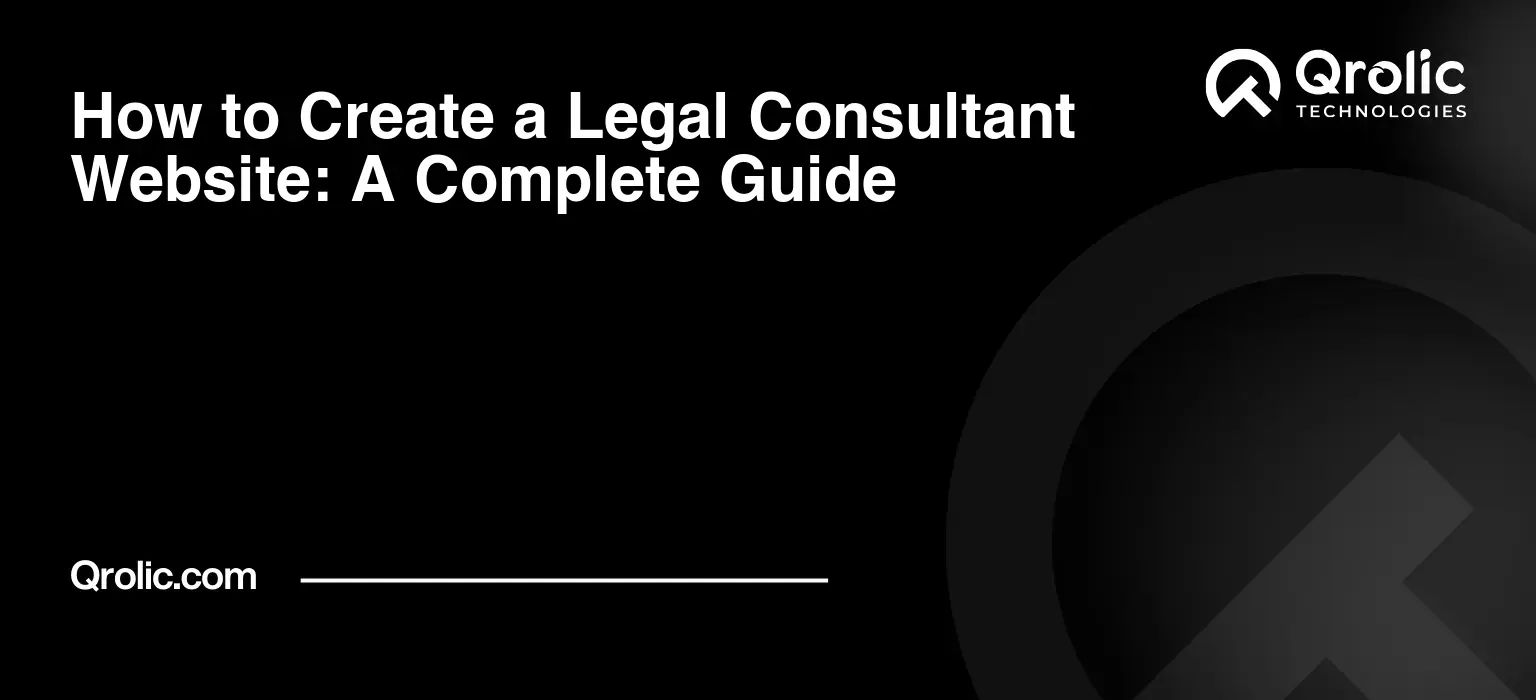Quick Summary:
- Your website is your essential digital storefront.
- It builds trust and showcases legal expertise.
- Focus on user-friendly design, content, and SEO.
- A strong site attracts clients and drives firm growth.
Table of Contents
- The Digital Courtroom: Why Your Legal Consultancy Needs a Powerful Online Presence
- Why a Website Matters: Beyond a Simple Online Brochure
- The Cost of Inaction: Losing Clients to the Competition
- Key Elements of a High-Performing Legal Consultancy Website
- 1. User-Centric Design: Prioritizing the Client Experience
- 2. Compelling Content: Informing, Engaging, and Building Trust
- 3. Search Engine Optimization (SEO): Getting Found Online
- 4. Lead Generation: Turning Visitors into Clients
- 5. Security and Compliance: Protecting Client Data
- 6. Analytics and Tracking: Measuring Your Success
- The Development Process: From Concept to Launch
- 1. Planning and Strategy: Defining Your Goals and Audience
- 2. Design: Creating a Visually Appealing and User-Friendly Website
- 3. Development: Building the Functionality of Your Website
- 4. Content Creation: Writing Compelling and Informative Content
- 5. Launch: Making Your Website Live
- 6. Maintenance and Updates: Keeping Your Website Fresh and Secure
- Common Mistakes to Avoid in Legal Consultancy Website Development
- Measuring the ROI of Your Legal Consultancy Website
- Qrolic Technologies: Your Partner in Legal Website Development
- Future Trends in Legal Website Development
The Digital Courtroom: Why Your Legal Consultancy Needs a Powerful Online Presence

In the 21st century, the courtroom isn’t just a physical space. It’s increasingly digital. Potential clients begin their search for legal guidance online, meticulously researching firms, attorneys, and their areas of expertise. A robust, well-designed website for your legal consultancy is no longer optional; it’s your digital storefront, your first impression, and often, the deciding factor in securing new business. Ignoring this reality is akin to practicing law with your hands tied behind your back.
Why a Website Matters: Beyond a Simple Online Brochure
Think of your website as a dynamic, 24/7 marketing tool. It’s more than just an online brochure; it’s a lead generation machine, a trust-building platform, and a reflection of your firm’s professionalism and expertise.
- Building Credibility and Trust: In the legal field, trust is paramount. A professional website with clear information about your team, experience, and client testimonials immediately builds credibility. Potential clients are looking for reassurance that you’re competent and capable of handling their legal matters. A poorly designed or outdated website can instantly erode that trust.
- Expanding Your Reach: Your website removes geographical limitations. You can attract clients from across your city, state, or even the country, significantly expanding your potential client base. Search engine optimization (SEO) ensures that your website appears prominently in search results when potential clients are looking for legal services in your area.
- Showcasing Your Expertise: A well-structured website allows you to highlight your specific areas of expertise. Clearly define your practice areas, such as corporate law, family law, intellectual property, or criminal defense. Share informative articles, blog posts, and case studies that demonstrate your knowledge and experience in these areas.
- Generating Leads and Inquiries: Implement lead capture forms on your website to collect contact information from interested visitors. Offer free consultations, downloadable resources, or email newsletters to incentivize visitors to share their information.
- Providing Client Support: Use your website to provide valuable resources and support to existing clients. Create a client portal where they can access documents, track the progress of their cases, and communicate with your team.
- Staying Competitive: In a competitive legal market, a strong online presence is crucial for standing out from the crowd. A modern, user-friendly website demonstrates that your firm is forward-thinking and committed to providing excellent service.
- Cost-Effectiveness: Compared to traditional marketing methods like print advertising, a website offers a more cost-effective way to reach a large audience and generate leads.
The Cost of Inaction: Losing Clients to the Competition
Without a professional website, you’re essentially invisible to a significant portion of your target audience. You’re handing potential clients over to your competitors who have invested in building a strong online presence. Consider these consequences:
- Missed Opportunities: You’re missing out on valuable leads and inquiries from potential clients who are actively searching for legal services online.
- Damaged Reputation: An outdated or poorly designed website can damage your firm’s reputation and credibility.
- Competitive Disadvantage: You’re at a disadvantage compared to competitors who have a strong online presence and are actively using their website to attract new clients.
- Limited Growth Potential: Without a website, your firm’s growth potential is limited to referrals and traditional marketing methods.
Key Elements of a High-Performing Legal Consultancy Website

A successful legal consultancy website isn’t just about aesthetics. It’s a strategic tool that requires careful planning and execution. Here are the key elements you need to consider:
1. User-Centric Design: Prioritizing the Client Experience
- Intuitive Navigation: Make it easy for visitors to find the information they need. Use clear and concise menus and navigation labels. Avoid jargon and technical terms that may confuse potential clients.
- Mobile Responsiveness: Ensure your website is fully responsive and adapts seamlessly to different screen sizes and devices. Mobile devices now account for a significant portion of web traffic, so a mobile-friendly website is essential.
- Fast Loading Speed: A slow-loading website can frustrate visitors and drive them away. Optimize your website’s images, code, and hosting to ensure fast loading speeds. Aim for a loading time of under 3 seconds.
- Accessibility: Design your website to be accessible to users with disabilities, adhering to accessibility guidelines such as WCAG (Web Content Accessibility Guidelines). This includes providing alternative text for images, using sufficient color contrast, and ensuring keyboard navigation.
- Clean and Professional Design: A clean and professional design conveys trust and credibility. Avoid clutter, excessive animations, and distracting graphics. Use high-quality images and videos that are relevant to your content.
- Clear Call to Actions (CTAs): Guide visitors towards specific actions, such as scheduling a consultation, contacting your firm, or downloading a resource. Use clear and compelling CTAs that stand out on the page. Examples include: “Schedule a Free Consultation,” “Contact Us Today,” or “Download Our Guide to Estate Planning.”
2. Compelling Content: Informing, Engaging, and Building Trust
- Clear and Concise Language: Avoid legal jargon and technical terms that may confuse potential clients. Use clear and concise language that is easy to understand.
- Focus on Client Needs: Address the specific needs and concerns of your target audience. Explain how your services can help them resolve their legal issues.
- Showcase Your Expertise: Share informative articles, blog posts, and case studies that demonstrate your knowledge and experience in your practice areas.
- Client Testimonials: Include testimonials from satisfied clients to build trust and credibility. Ask clients if they’re comfortable providing a quote and a photo.
- Attorney Profiles: Provide detailed profiles of your attorneys, highlighting their experience, qualifications, and areas of expertise. Include professional photos and contact information.
- FAQ Section: Answer common questions that potential clients may have about your services, fees, and legal processes.
- Contact Information: Make it easy for visitors to contact you. Include your phone number, email address, physical address, and a contact form on every page of your website.
- Blog: A regularly updated blog allows you to share your insights on legal topics, address current events, and demonstrate your expertise.
3. Search Engine Optimization (SEO): Getting Found Online
- Keyword Research: Identify the keywords and phrases that potential clients are using to search for legal services in your area. Use keyword research tools like Google Keyword Planner, Ahrefs, or SEMrush. Focus on keywords like “legal consultancy website development,” “attorney web design,” and “law consultant website.”
- On-Page Optimization: Optimize your website’s content, title tags, meta descriptions, and header tags with relevant keywords.
- Off-Page Optimization: Build high-quality backlinks from other reputable websites in your industry.
- Local SEO: Optimize your website for local search by including your city and state in your keywords and content. Claim and optimize your Google My Business listing. Encourage clients to leave reviews on Google.
- Technical SEO: Ensure your website is technically sound and optimized for search engines. This includes having a sitemap, robots.txt file, and optimized page speed.
- Content Marketing: Create high-quality content that attracts and engages your target audience. Share your content on social media and other online platforms.
4. Lead Generation: Turning Visitors into Clients
- Contact Forms: Include contact forms on key pages of your website, such as your homepage, contact page, and service pages.
- Free Consultations: Offer free consultations to potential clients. This is a great way to build rapport and assess their legal needs.
- Downloadable Resources: Offer free downloadable resources, such as ebooks, guides, and checklists, in exchange for visitors’ contact information.
- Email Marketing: Build an email list and send regular newsletters to your subscribers. Share informative content, promote your services, and announce upcoming events.
- Live Chat: Implement live chat on your website to provide instant support to visitors.
- Appointment Scheduling: Allow visitors to schedule appointments directly through your website.
5. Security and Compliance: Protecting Client Data
- SSL Certificate: Install an SSL certificate to encrypt data transmitted between your website and visitors. This is essential for protecting sensitive information, such as credit card numbers and personal data.
- Privacy Policy: Create a clear and comprehensive privacy policy that outlines how you collect, use, and protect client data.
- Terms of Service: Create terms of service that govern the use of your website.
- Compliance with Legal Regulations: Ensure your website complies with all applicable legal regulations, such as the GDPR (General Data Protection Regulation) and CCPA (California Consumer Privacy Act).
- Regular Security Audits: Conduct regular security audits to identify and address potential vulnerabilities.
6. Analytics and Tracking: Measuring Your Success
- Google Analytics: Install Google Analytics to track your website’s traffic, user behavior, and conversions.
- Conversion Tracking: Set up conversion tracking to measure the effectiveness of your lead generation efforts.
- Regular Reporting: Regularly review your website’s analytics and track your progress towards your goals.
- A/B Testing: Conduct A/B testing to optimize your website’s design, content, and CTAs.
The Development Process: From Concept to Launch

Developing a website for a legal consultancy firm involves a structured process. Here’s a breakdown:
1. Planning and Strategy: Defining Your Goals and Audience
- Define Your Objectives: What do you want to achieve with your website? Increase leads? Build brand awareness? Provide client support?
- Identify Your Target Audience: Who are you trying to reach? What are their needs and concerns?
- Conduct Competitive Analysis: Analyze your competitors’ websites to identify their strengths and weaknesses.
- Develop a Content Strategy: Plan the content you will include on your website.
- Create a Sitemap: Outline the structure and organization of your website.
- Establish a Budget: Determine how much you are willing to spend on website development.
2. Design: Creating a Visually Appealing and User-Friendly Website
- Choose a Design Style: Select a design style that is consistent with your brand and target audience.
- Create Wireframes: Develop wireframes to visualize the layout and structure of your website pages.
- Design Mockups: Create design mockups to showcase the visual appearance of your website.
- Gather Feedback: Obtain feedback on your designs from stakeholders and potential users.
- Refine Designs: Revise your designs based on feedback.
3. Development: Building the Functionality of Your Website
- Choose a Platform: Select a platform for building your website, such as WordPress, Drupal, or Joomla. WordPress is often the preferred choice due to its flexibility, ease of use, and extensive plugin library.
- Develop the Website: Build the functionality of your website based on your designs and specifications.
- Test the Website: Thoroughly test your website to ensure it is functioning properly and is free of errors.
- Optimize for Search Engines: Optimize your website for search engines by implementing SEO best practices.
4. Content Creation: Writing Compelling and Informative Content
- Write Clear and Concise Content: Use clear and concise language that is easy to understand.
- Optimize Content for Search Engines: Optimize your content for search engines by including relevant keywords.
- Proofread and Edit Content: Carefully proofread and edit your content to ensure it is error-free.
- Add Images and Videos: Use high-quality images and videos to enhance your content.
5. Launch: Making Your Website Live
- Choose a Domain Name: Select a domain name that is relevant to your business and easy to remember.
- Choose a Web Hosting Provider: Select a reliable web hosting provider that can handle your website’s traffic and storage needs.
- Deploy Your Website: Upload your website files to your web hosting server.
- Test Your Website: Thoroughly test your website to ensure it is functioning properly.
- Promote Your Website: Promote your website through social media, email marketing, and other online channels.
6. Maintenance and Updates: Keeping Your Website Fresh and Secure
- Regularly Update Your Website: Keep your website’s content, software, and plugins up to date.
- Monitor Your Website’s Performance: Monitor your website’s traffic, user behavior, and conversions.
- Conduct Security Audits: Conduct regular security audits to identify and address potential vulnerabilities.
- Back Up Your Website: Regularly back up your website to protect against data loss.
Common Mistakes to Avoid in Legal Consultancy Website Development

- Using Generic Templates: Avoid using generic website templates that don’t reflect your brand or target audience.
- Ignoring Mobile Responsiveness: Failing to ensure your website is mobile-friendly.
- Neglecting SEO: Not optimizing your website for search engines.
- Using Legal Jargon: Using legal jargon that is difficult for potential clients to understand.
- Failing to Update Content Regularly: Not keeping your website’s content fresh and up-to-date.
- Ignoring Analytics: Not tracking your website’s performance and making data-driven decisions.
- Poor Quality Images: Avoid low-resolution or unprofessional images.
- Hidden Fees: Failing to be transparent about your fees and pricing.
Measuring the ROI of Your Legal Consultancy Website

Measuring the return on investment (ROI) of your legal consultancy website is crucial for determining its effectiveness and justifying the investment. Here are some key metrics to track:
- Website Traffic: Monitor the number of visitors to your website, as well as their source (e.g., organic search, paid advertising, social media).
- Bounce Rate: Track the percentage of visitors who leave your website after viewing only one page. A high bounce rate may indicate that your website is not engaging or relevant to visitors.
- Time on Site: Measure the average amount of time visitors spend on your website. A longer time on site suggests that visitors are engaged with your content.
- Conversion Rate: Track the percentage of visitors who complete a desired action, such as filling out a contact form, scheduling a consultation, or downloading a resource.
- Lead Generation: Monitor the number of leads generated through your website.
- Cost Per Lead: Calculate the cost of acquiring each lead through your website.
- Client Acquisition: Track the number of leads that convert into paying clients.
- Revenue Generated: Measure the revenue generated from clients acquired through your website.
- Customer Lifetime Value (CLTV): Estimate the total revenue you expect to generate from each client over their relationship with your firm.
By tracking these metrics, you can gain valuable insights into your website’s performance and identify areas for improvement. You can then use this data to optimize your website and maximize your ROI.
Qrolic Technologies: Your Partner in Legal Website Development

Qrolic Technologies (https://qrolic.com/) understands the unique needs of legal consultancy firms. We offer comprehensive website development services tailored to the legal industry, helping you establish a strong online presence, attract new clients, and enhance your firm’s reputation.
Here’s how Qrolic Technologies can help you:
- Custom Website Design: We create custom website designs that are visually appealing, user-friendly, and reflect your brand identity.
- Mobile-First Approach: We ensure your website is fully responsive and optimized for mobile devices.
- SEO Optimization: We implement proven SEO strategies to improve your website’s search engine rankings and drive organic traffic.
- Content Creation: We can help you create compelling and informative content that engages your target audience and showcases your expertise.
- Lead Generation: We implement lead generation strategies to turn website visitors into qualified leads.
- Security and Compliance: We ensure your website is secure and compliant with all applicable legal regulations.
- Ongoing Support and Maintenance: We provide ongoing support and maintenance to keep your website running smoothly and securely.
Why Choose Qrolic Technologies?
- Experience: We have extensive experience in developing websites for legal consultancy firms.
- Expertise: Our team of designers, developers, and SEO experts has the skills and knowledge to create a high-performing website for your firm.
- Custom Solutions: We provide customized solutions that are tailored to your specific needs and goals.
- Results-Driven Approach: We are focused on delivering results that help you grow your business.
- Excellent Customer Service: We are committed to providing excellent customer service and support.
Let Qrolic Technologies help you create a website that reflects your firm’s professionalism, expertise, and commitment to client service. Contact us today to learn more about our website development services for legal consultancy firms.
Future Trends in Legal Website Development

The world of Web Development is constantly evolving, and legal websites are no exception. Staying ahead of the curve is crucial for maintaining a competitive edge. Here are some future trends to watch:
- Artificial Intelligence (AI): AI-powered chatbots and virtual assistants will become increasingly common on legal websites, providing instant support and guidance to potential clients.
- Personalization: Websites will become more personalized, tailoring content and experiences to individual users based on their interests and needs.
- Video Marketing: Video will continue to be a dominant form of content, with legal firms using video to showcase their expertise, share client testimonials, and explain complex legal concepts.
- Voice Search Optimization: optimizing your website for voice search will become increasingly important as more people use voice assistants like Siri and Alexa to find information.
- Increased Focus on User Experience (UX): Websites will prioritize user experience even further, focusing on creating intuitive and seamless experiences for visitors.
- Blockchain Technology: Blockchain technology may be used to enhance the security and transparency of legal websites.
- Augmented Reality (AR) and Virtual Reality (VR): AR and VR may be used to create immersive experiences for potential clients, such as virtual tours of your office or simulations of legal proceedings.
By embracing these future trends, legal consultancy firms can create websites that are more engaging, informative, and effective at attracting new clients.
In conclusion, a well-developed website is an essential tool for any legal consultancy firm looking to thrive in today’s digital age. By focusing on user-centric design, compelling content, SEO optimization, and lead generation, you can create a website that attracts new clients, builds trust, and enhances your firm’s reputation. Remember to partner with a reputable website development company like Qrolic Technologies to ensure your website is a success. The digital courtroom is open, are you ready to make your case?









